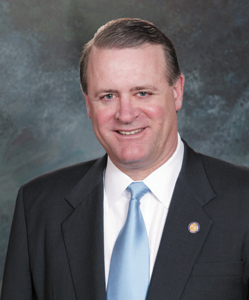STRAIGHT FROM THE SENATE
 LAWMAKERS DETERMINED TO PASS BALANCED BUDGET WITHOUT RAISING TAXES ON HARD-WORKING HOOSIERS
LAWMAKERS DETERMINED TO PASS BALANCED BUDGET WITHOUT RAISING TAXES ON HARD-WORKING HOOSIERS
Passing a balanced budget and avoiding tax hikes on hardworking Hoosiers should be the top priorities for lawmakers during the 2011 legislative session. With the national recession reducing state revenues to 2005 levels, legislators must set and live within tight spending limits, just as Hoosier families, farmers and employers are doing every day. By doing so, we can prioritize education and essential services like public safety, while protecting Indiana taxpayers from recovery-killing tax hikes.
Legislators will be working to achieve what we hope will be a fourth consecutive balanced budget when they convene Wednesday, January 5.
This may be among the most difficult years in state history to construct a balanced budget. According to the Center on Budget and Priorities, budget writers will be facing the toughest income period for state governments in 60 years. Revenue for the last fiscal year came in nearly $1 billion less than budgeted. State revenues for fiscal year 2010 were less than those for fiscal year 2005 – a five-year step backward in state revenues.
November’s revenue report for Indiana showed some progress, with collections up $49 million over the most recent revenue forecast, but $2 million below the amount assumed in the 2009 budget.
This underscores the importance of our having protected the $1.3 billion in rainy-day fund when we passed the current two-year budget in 2009. We are still utilizing those reserves to maintain vital services and avoid emergency tax hikes. Without them, we would already be in the red.
November’s report was highlighted by the fact that sales tax revenue has now increased on a year-over-year basis for nine consecutive months, an encouraging sign that Indiana is slowly emerging from the national recession.
We don’t want to thwart this progress by raising taxes in a fragile recovery. Indiana is one of only five states – and the only one in the Midwest – to not raise taxes or consider raising taxes since the beginning of the current recession. A total of 35 states have already raised taxes and 10 more are now considering it, according to the governor’s office.
That ultimately means a balanced budget will happen only if tough choices are made and non-essential things are cut. It’s something every family and business has to do; government should be no different.
In a recent presentation by Gov. Mitch Daniels, he reported nearly $2 billion in spending reductions by state government since the recession began. The bulk of those reductions – 70 percent – came from state agencies, where hiring freezes were implemented, jobs were consolidated and employees have gone without raises.
State employment levels have been drastically reduced and are now at their lowest point in 25 years. Most salaries have been frozen and in some cases, cost-saving efforts have been modestly rewarded with one-time bonuses.
Little things have also accumulated to make big impacts, like reducing out-of-state travel, stopping purchases of business cards, closing and consolidating offices, reducing the number of government vehicles and increasing the amount of electronic communication used.
Actions like these have helped Indiana maintain a strong economic position. We are one of only nine states to have a top bond rating from all three major credit rating agencies.
Leaders in both chambers of the Indiana General Assembly and the governor have been unanimous in saying they will not raise taxes next year. While that makes for continued tough decisions ahead, this is good news for Hoosier families and businesses already struggling to weather the worst economic storm since the Great Depression.
- THANK YOU INDIANA, IT HAS BEEN AN HONOR – Straight From The Senate - November 9, 2018
- CYBERSECURITY AWARENESS MONTH – Straight From The Senate - October 26, 2018
- INDIANA’S ECONOMY IS THRIVING – Straight From The Senate - October 12, 2018

